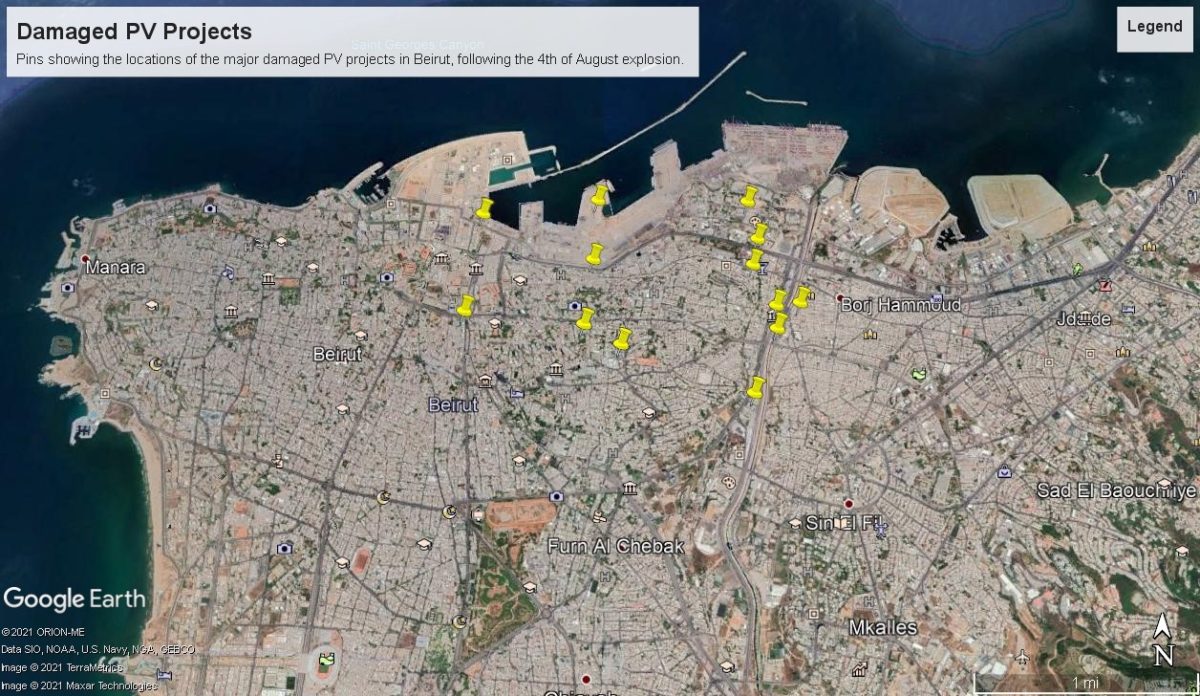The Lebanese Center for Energy Conservation (LCEC) has said Lebanon’s cumulative solar capacity stood at 89.84 MW at the end of last year.
Whilst that figure was short of the national target of 100 MW of photovoltaics in 2020, the news the nation saw 13.76 MW of new solar last year is remarkable, given Lebanon is teetering on the brink of an economic and political collapse.
With rooftop solar systems, backed by a net-metering regime, providing the backbone of Lebanese solar, LCEC executive director Rani Al Anchkar told pv magazine at least 865 net-metered systems were installed and operational by the end of April this year.
Thus far, government attempts to attract utility-scale solar have not borne fruit.
On the brink of collapse
Lebanon’s failure to make a bond payment last year led to its first sovereign default. With national debt spiraling, the Lebanese pound falling to record lows and people increasingly unable to source even basic goods, there is huge unrest among citizens, many of whom accuse the nation's political elite of bad governance, corruption and incompetence.
Such criticism appeared to be tragically confirmed on August 4 last year, when a large amount of ammonium nitrate which had been stored without sufficient safety measures at the Port of Beirut exploded, killing at least 218 people and leaving around 300,000 homeless.
The blast incited public anger and led to the resignation of the government, although Lebanese president Michel Aoun subsequently asked the cabinet to stay on in a caretaker capacity which remains in force today. Attempts to form a new government appear bound to fail unless parliamentarians step outside the political elite to form a cabinet committed to reform.
The international community, led by France and the European Union, have made clear there will be no financial aid for Lebanon until there is a government willing to reform the economy, including the energy market. Meanwhile, Lebanese citizens face dire shortages of medicines, fuel and electricity daily and the national currency has lost around 90% of its value against the dollar, driving hyperinflation.
Electricity users are either seeking to run diesel generators or install solar-plus-battery systems. Accessing diesel at punitively high prices on the black market is a risky business which has driven unprecedented demand for solar and storage systems. The sellers of PV and home battery systems, however, demand payment in foreign currency, forcing prices up beyond the reach of many citizens.
The LCEC's report on the state of Lebanese solar in 2020 is expected soon but it is the 2021-related numbers, due out late next year, which could reveal the extent of any surge in small scale solar and storage systems.
Draining financial support
The €80 million Lebanon Energy Efficiency and Renewable Energy Finance Facility, which offered low-interest loans to enable private sector entities to install renewables and energy efficiency measures, “expired [at] the end of 2020, mainly due to the currency devaluation and the economic crisis,” Al Anchkar told pv magazine.
The program, started in 2018, had been bankrolled by EU lender the European Investment Bank and France's development agency, with the loans coordinated by the Central Bank of Lebanon.
Blasted solar PV systems
National energy agency the LCEC is also finalizing a report into the dozen or so solar systems damaged in last year's port blast, including a 220 kW array which was commissioned on the roof of wheat silos which were destroyed by the explosion just ten days later.
The agency said at least a dozen more solar arrays were damaged in the catastrophe and has shown pv magazine a map of the systems concerned.
This copy was amended on 23/08/21 to indicate the LCEC prepares an annual update on solar statistics, and to include Rani Al Anchkar's name at the LCEC's request.
This content is protected by copyright and may not be reused. If you want to cooperate with us and would like to reuse some of our content, please contact: editors@pv-magazine.com.



2 comments
By submitting this form you agree to pv magazine using your data for the purposes of publishing your comment.
Your personal data will only be disclosed or otherwise transmitted to third parties for the purposes of spam filtering or if this is necessary for technical maintenance of the website. Any other transfer to third parties will not take place unless this is justified on the basis of applicable data protection regulations or if pv magazine is legally obliged to do so.
You may revoke this consent at any time with effect for the future, in which case your personal data will be deleted immediately. Otherwise, your data will be deleted if pv magazine has processed your request or the purpose of data storage is fulfilled.
Further information on data privacy can be found in our Data Protection Policy.